Very impressing AAR. I just spotted it and have to admit being thrilled. I hope you continue soon...
Double Domination: Germany versus Japan
- Thread starter knul
- Start date
-
We have updated our Community Code of Conduct. Please read through the new rules for the forum that are an integral part of Paradox Interactive’s User Agreement.
You are using an out of date browser. It may not display this or other websites correctly.
You should upgrade or use an alternative browser.
You should upgrade or use an alternative browser.
Creative AAR, been reading since the beginning. It would be really cool to see variations of this theme for other pairings of countries (hint hint nudge nudge)
No, losing cores are a bad thing  So it's always important to take them before you lose them
So it's always important to take them before you lose them 
Thanks, Arrianus. I will continue soonVery impressing AAR. I just spotted it and have to admit being thrilled. I hope you continue soon...
Thank you, Retrograde. It would be fun if other players would do a similar AAR with different countriesCreative AAR, been reading since the beginning. It would be really cool to see variations of this theme for other pairings of countries (hint hint nudge nudge)
Indeed. Also, reducing that ugly yellow blob to my east is a nice bonus.No, losing cores are a bad thingSo it's always important to take them before you lose them

Last edited:

Turn 11, first half: Revenge of the Japanese.
Jim: Welcome, dear viewers. As our Japanese friends are ready to go to the year 1600, the IDDA has decided to give them a bit of a boost, as the match has become unbalanced. With us is the Referee.
Referee: Good day Jim, Bob.
Jim: If I understood you correctly, Referee, some big changes will take place. Can you tell us what these are?
Referee: Currently, Germany is far ahead of Japan. Not only does this make the match less exciting, this unbalance is largely due to circumstances. The German team was very lucky to unite their country so quickly and the Japanese contestants are greatly hindered by the natives' lack of understanding how important Westernisation is.
Bob: Japan has indeed an extremely slow Westernisation. It's already 50 years since the first step towards Westernisation.
Referee: Right. Finally, the IDDA has to admit that it underestimated the number of buildings Germany would conquer. The natives in this timeline, numbered 5.1 by chronotists, are quite adept at construction, so that with each German province, the contestants gain about 10 buildings.
Jim: A boost to their economy that the Japanese will have difficulty matching.
Referee: So we have decided on three changes in the match.
- To help Japan Westernise quicker, they get a one-time stability boost of three. In 1600 Japanese stability was at -1; the space-time continuum has been edited so that it is now +2.
- Germany will get a penalty to magistrate gain: -2 per year, to counter the enormous amount of buildings they conquered. This penalty may be revoked if the Japanese economy becomes much bigger than the German.
- Perhaps the biggest change is that the German team has to skip turn 11. Normally, Japan would play 1600-1610, the Germans 1610-1620 and then the Japanese 1620-30, etcetera. However, it is decided that the German half will be given to the Japanese, so that they are in play 1600-1630, after which the Germans return and the match progresses normally.
Bob: Extra time for the Japanese team will be a major boost, seeing how incompetent the natives are. They have lost the majority of the fleet without having a war, making this the third time they lost their fleet.
Jim: Thank you Referee. Some big changes, still it remains unsure if Japan will manage to gain on German's lead.
Bob: Especially as Japan has lost all its Unions in 1598. Perhaps due to their annexation of the vassal Deccan kingdom?
Jim: Could be, Bob, could be. Luckily, a ten-year Casus Belli of Restoration is in force on Bihar, Orissa, Gondwana and Mysore. Which is used immediately as a War of Restoration of the Union is declared on Wu in 1600.
Bob: Also, due to the stability boost, in June Japan is ready for the final Westernisation step. This was only possible due to the high Administration skill of the young emperor Saiin, 7 on a scale of 9. Only the modernisation of the army remains to be done.

Jim: Nice. The influx of Western tech far outstrips Japan's domestic economy by a factor of 2 or 3. Perhaps this will close the enormous gap between Japanese and German tech.
Bob: In 1601, Wu is back into a Union under Japan. Gondwana is the next target for Restoration.
Jim: Too bad Malwa seceded from Gondwana, splitting it in two.
Bob: No fear, Jim. Forged documents are presented to the world in 1602 and Japan declares war on Malwa to enforce their claims. Rajputana and Sind oppose this move and declare war on Japan.
Jim: Ooh, another big Indian war!
Bob: Brutal and short. In 1603, Gondwana and Malwa become junior partners under the sandal of Japan and Sind is vassalised.
Jim: Our contestants aren't kidding. It seems they are intend on making the most of their thirty years in the field.
Bob: Indeed, they are very focussed on conquest. Look here, for example.
Jim: You mean the Ganges delta?
Bob: Indeed. A Hindu province which has been conquered by Muslim Ceylon. This gives Japan the excuse for a new war. With no allies, Ceylon falls within months to the Japanese might: the Ganges delta goes to its conqueror Orissa, which is no longer a subject of Japan, while Ceylon itself becomes Japan's vassal.
Jim: Why isn't Orissa dealt with?
Bob: I think because the royal marriage between the nephew of the Orissan king and the niece of Saiin would destabilise Japan if war broke out. Stability is still hard to regain as the military struggle to modernise.
Jim: Still, others await Restoration. In 1604 Bihar is returned to the fold with a short war and in 1605 Mysore follows. These demonstrations of Imperial power enable the Emperor to increase Centralisation, at the cost of a hit to stability.
Bob: In 1606 most of the lost sheep are herded back, while three new subject nations are gained. Let's take a look at the satellite image:
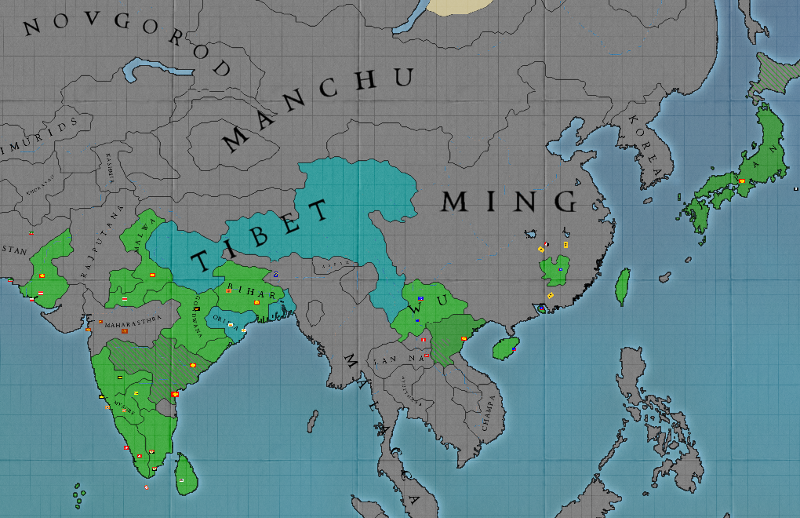
Jim: Almost all of India is under Japanese rule, safe for Rajputana, Maharastra, Persia (on the northwest coast), the British colony and of course Orissa.
Bob: Not for long. In 1608 the rapid advances in political science gives our contestants the opportunity to increase government control over the Shinto temples, making it easier to regain national stability.
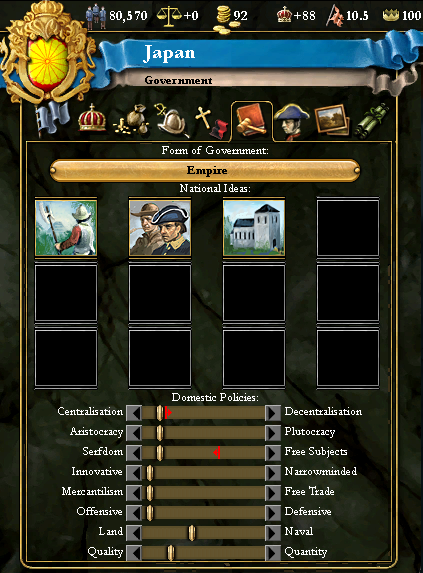
Jim: By the way, Japan is quite a leftist country at this point, don't you agree?
Bob: Ehm, if you say so, Jim. Anyway, as stability is now less of an issue, a Restoration War breaks out with Orissa, just before its expiration date.
Jim: Didn't know that abstract socio-political constructs were perishable.
Bob: Sush. Orissa is easily conquered and in a month or three they are the last revolter Union to return to Japanese control.
Jim: A nice decade for Japan: restoring a lost empire, Westernisation and the quick technological progress it brings and a couple of new subjects. After the break we will continue with the second half of turn 11. As that turn is played by the Japanese as well, we no give a quick overview of the German situation to satisfy their fans.
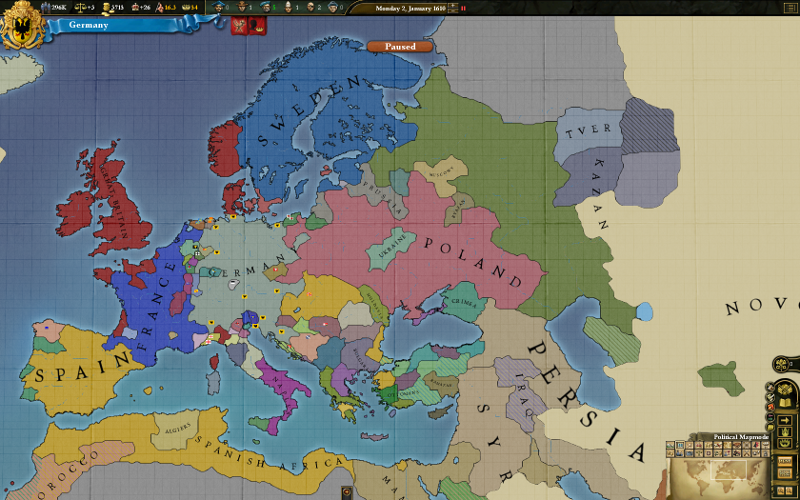
Jim: As you can see, Germany has successfully wrested Pressburg from Spain, in 1602 according to our reporters. Also, Germany's main vassal Hesse has been annexed. Domestically the Importation Act has been established, setting back the drive towards Free Trade a bit. With that said, see you after the break!
Last edited:
What is the Japanese team's thought process on going after India rather than Korea and Ming? Is it a power differential which makes the Indian powers easier to defeat?
Great Britain and Spain have interesting empires in Europe. I'm curious to see where the team will decide to advance next. Europe, or start heading and expanding more in Asia.
Great Britain and Spain have interesting empires in Europe. I'm curious to see where the team will decide to advance next. Europe, or start heading and expanding more in Asia.
Dank je wel*, Slibbo!It's really fun to read your AAR's. Dank U wel!
Korea and Ming, along with Manchu, are the only nations within my culture group. If I inherit them I will instantly get cores on their territory. So I want to put them into a Union (see turn 9). Sadly, besides that thing with Ming, no opportunities for a Unification war has presented itself. Besides that I don't have good CB on Korea, Ming or Manchu. I was lucky getting claims on some Indian princes, probably due to Vijayanagar falling apart and creating all those new low-legitimacy nations.What is the Japanese team's thought process on going after India rather than Korea and Ming? Is it a power differential which makes the Indian powers easier to defeat?
Great Britain and Spain have interesting empires in Europe. I'm curious to see where the team will decide to advance next. Europe, or start heading and expanding more in Asia.
So in short, I went to India not because of any power differentials but because of the CB opportunities (or lack thereof).
The same issue will be even more important with Germany, as it needs CB to wage war at all and has a heft infamy penalty. Germany will expand wherever the opportunity presents itself.
*Dutch for "Thank you".
Last edited:

Turn 11, second half: Japan Reloaded
Jim: Welcome back to the match, everyone. Japan now enters the 1610's, while the German teams stays on the bench, as ordered by the Referee. I see that two exiting things are happening right now, Bob.
Bob: Right you are, Jim. First, the trade technological level has increased to 15, meaning that the Japanese merchants are now able to establish monopolies. The trade centre in Kyoto soon sees a strong Japanese monopoly, greatly increasing Japan's trade income.
Jim: Japan's tech is really picking up since 1600, with new tech levels reached every year or two.
Bob: Second, the Manchurian king is seen as illegitimate by many, on which Japan capitalises. The Japanese diplomats scrape together some musty old documents that claim that the Imperial family held the Manchurian steppes many centuries ago. War is swiftly declared. The Chinese Emperor and the Korean king understand all too well the importance of this war and join forces under the Manchu flag. Two other rivals, Tibet and Maharastra, also join the side of Manchu to curb Japanese expansion.
Jim: Woa, that's a lot of info. Let's get something on the viewscreen to make things clearer for the viewers.
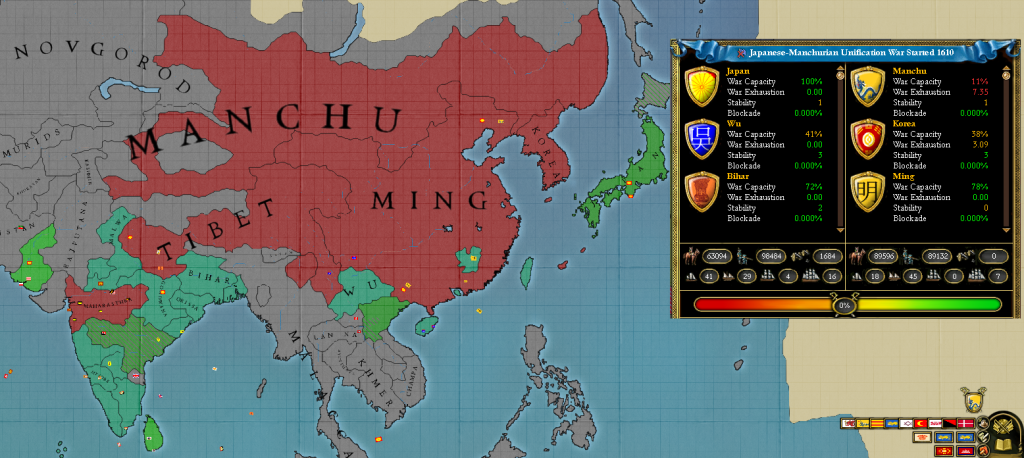
Bob: A mighty alliance, all in all, with more land troops than the Japanese. Still, with Japanese naval dominance, Imperial troops can travel quickly to each theatre.
Jim: Japan has also the advantage that all its allies are subjects and will not sign separate peaces, unlike the Manchurian alliance. Tibet has already signed a white peace in September 1610. In November Maharastra surrenders after being mauled by the Indian vassals, paying 150 ducats as reparation.
Bob: Still, Ming and Korea fiercely resist Japanese forces in the north of China. In a series of battles the outnumbered Japanese forces, consisting of thirteen regiments, are defeated and surrender. Yet, the casualties they inflicted convince the Korean king to step out of the war via a white peace.
Jim: I think the Koreans had another reason.
Bob: Really? What other reason, then?
Jim: Only a month after the Koreans back down, Japanese military engineers make a breakthrough: Land tech 18!
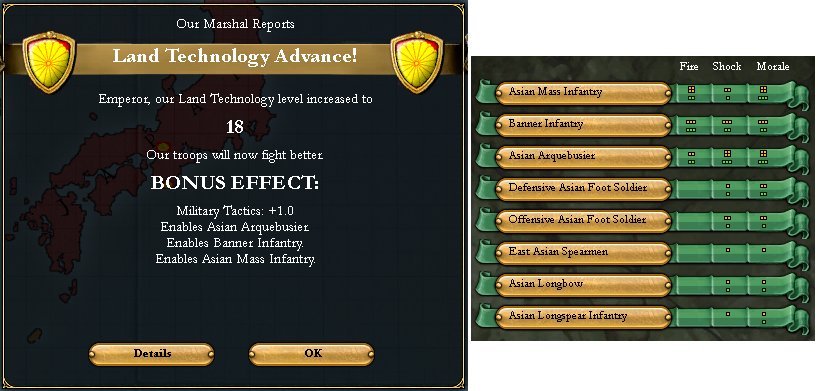
Bob: Aaah, I see. This will indeed increase the fighting power of the Imperial army immensely. New tactics will halve casualties and the introduction of the arquebus greatly increases Japanese fire power. Compared to the Defensive foot soldier used until now, the Asian Arquebusier is a tremendous improvement in both dealing as in sustaining damage.
Jim: It's really impressive how quickly the new technology is implemented. In only a couple of month the armies, scattered all over Asia, are modernised completely. Those officers must have a hell of a retraining course, for example.
Bob: Indeed impressive, and needed very much. While Japan did quite well against the Land tech level 10 armies of Ming and Manchu, with the new technology the armies rip through the enemy defences. In a mere fifteen months, 53 Chinese regiments are completely wiped out in set battles, with at least a dozen individual regiments destroyed one by one. This satellite image shows the progress so far in 1613.
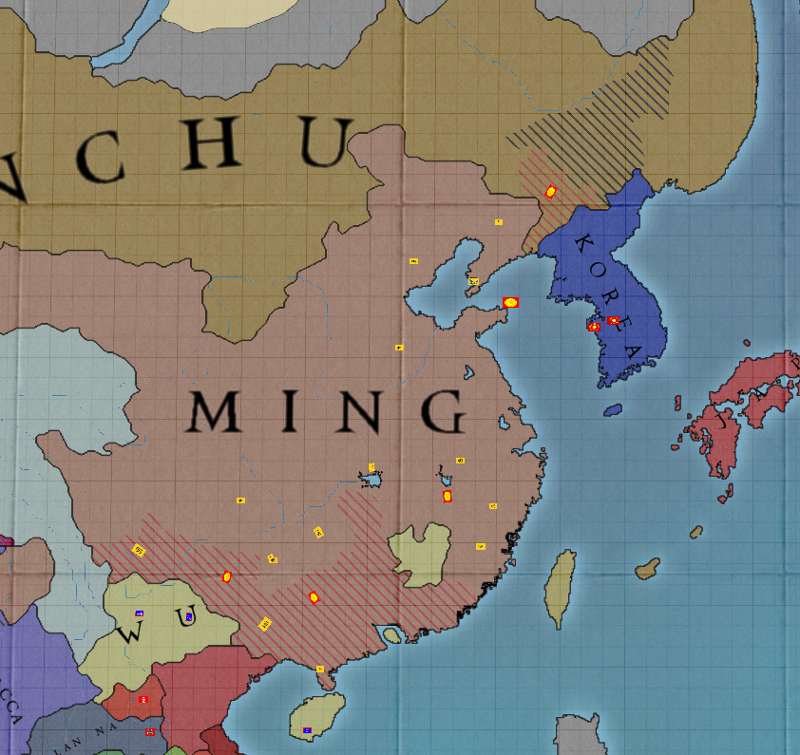
Jim: Interesting choice, focussing most of the war effort on subduing Ming. Not a bad strategy, seeing that Manchu had few forces and was exhausted already from previous wars.
Bob: While a small force of about twelve regiments annihilates the Manchu army and conquers Manchurian provinces, in the south the main body continues mauling the Chinese forces. In 1613 and 1614 at least 73 Chinese regiments are destroyed, not including numerous single regiments fresh from recruitment that were quickly shattered.
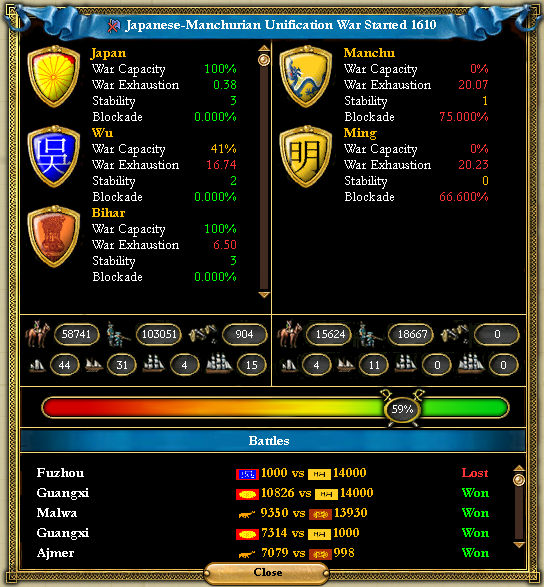
Jim: That's not a war, it's just a slaughter. It's staggering...
Bob: Fortunately, a very weary Ming surrenders and cedes Xia as per the negotiations.
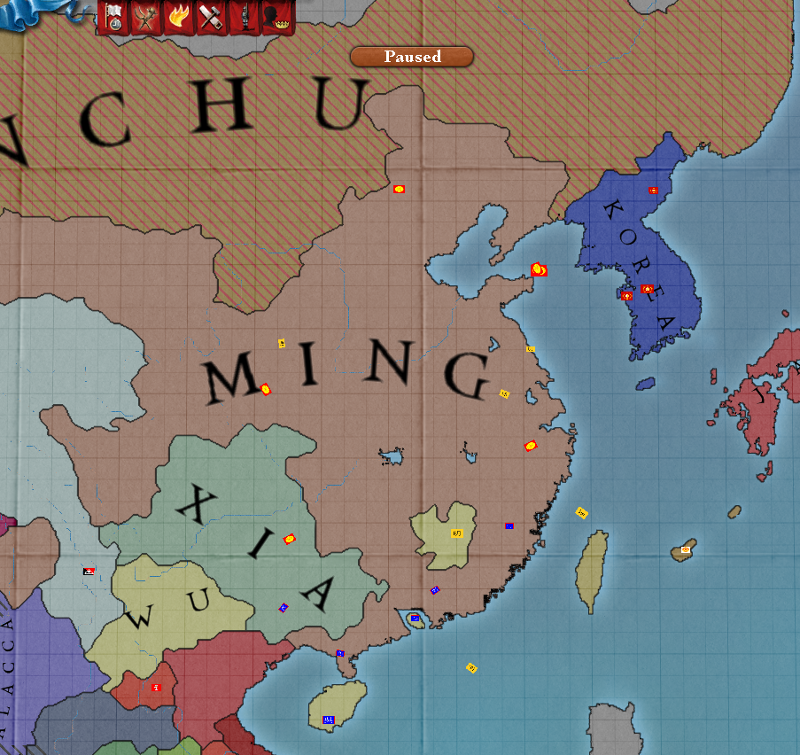
Bob: A month later, Manchu, devastated as well, agrees to become part of a Union under Japan. With that, the four-year Japanese-Manchurian Unification War has ended. It was the bloodiest war for Japan so far, with 89.000 casualties, even more than in the 2nd Japanese-Bruneian Religious War, although most of the casualties were from subject nations. However, the Manchurian Alliance lost a devastating 255.000 soldiers, making this the most lopsided war in the world so far.
Jim: A very successful war, as it brought Manchu under Japanese control and significantly reduced Ming. Japan takes a deserved breather, regaining its manpower and improving relations with Manchu.
Bob: Not for too long. The political situation in Asia is unwinding to Japan's advantage. Malacca, ruler of South-east Asia and one of the Asian great powers, has started to disintegrate. Here's a snapshot of the situation in 1617.
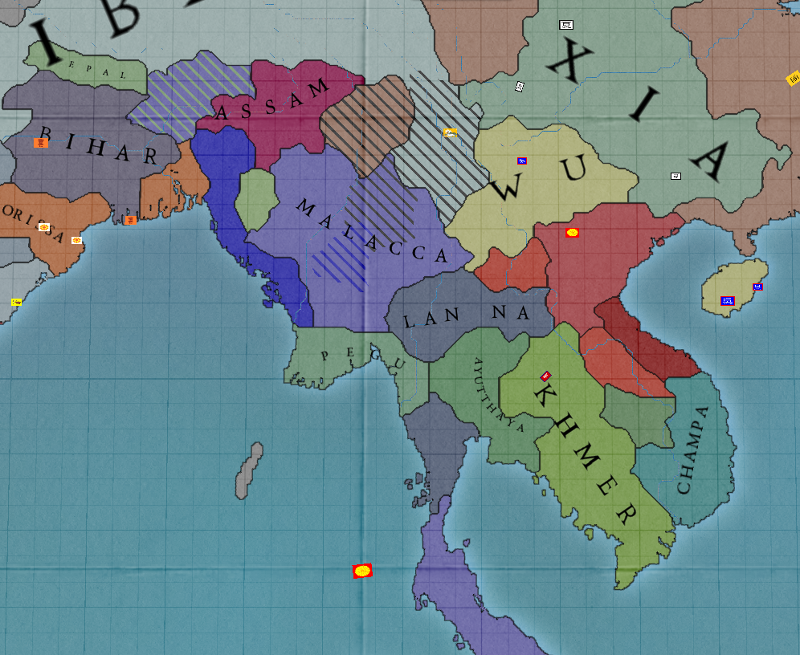
Jim: The religious situation is as complex as the political. The newly formed nations of Pegu and Ayutthaya, both ruled by Muslim sultans, have Buddhist provinces under control. This means that the Japanese can declare wars of religious liberation against them.
Bob: And they do. Soon most of south-east Asia is at war with Japan, as is the Sunni Defender of the Faith, Persia. Only Persia, with its Land tech level 20 armies, is a credible threat. At the end of the year, Japan has gained four provinces in south-east Asia, with only Persia continuing the war.
Jim: In 1618, Japanese forces invade the Persian homelands, after seizing the two Indian provinces. However, the large and advanced forces of Persia corner the invasion army and destroys it. Painful, as 21 regiments are lost in this risky adventure.
Bob: Still, the Emperor, being aided by the contestants, manages to increase the power of the government and make Japan even more Centralised. In June 1619, Japan agrees a peace with Persia by paying 77 ducats to the Persians, making this one of the few wars in which Japan has to admit defeat.
Jim: Good news, though, is coming in. Production tech level 19 is reached, so treasuries can be build. Promptly the home islands see a lot of new treasuries. Also, a Ming and a Tibetan province have rebelled and joined the Wu kingdom, a nice boon for its Japanese overlord.
Bob: Which ends this turn, which was completely played by the Japanese and with significant success. Four new subjects have been gained, the final Westernisation step executed, Ming and Malacca devastated, the Japanese Empire begins to dominate Asia.
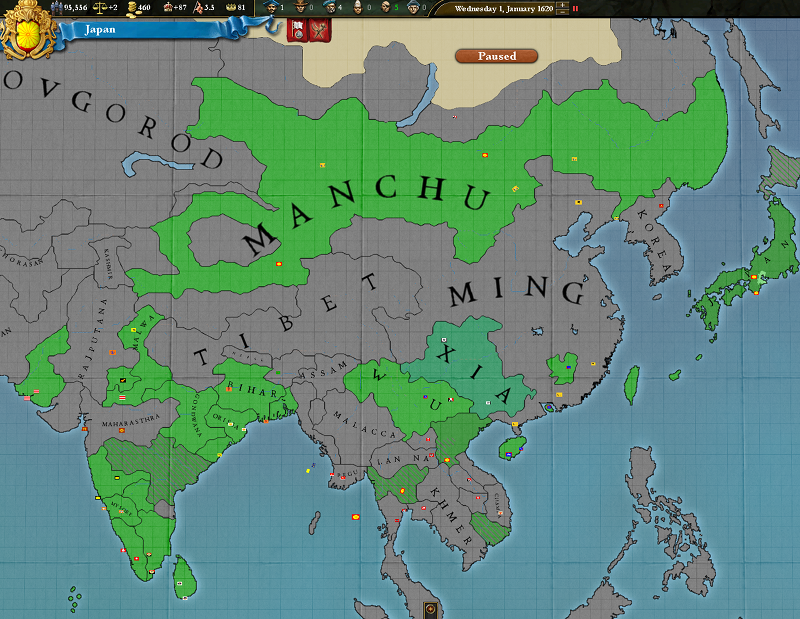
Jim: Very nice. Next time, we see not only the Japanese team in action, but we finally will have the Germans playing again. See you then!
Last edited:
You really need a union with Ming there to finish the set 
At least now with your new troops you can steamroll the rest of Asia.
At least now with your new troops you can steamroll the rest of Asia.
Excellent move by the Japanese, and I see that the tactic you mentioned came into play here with a vengeance. With Manchu under Japan's domain they also have a border with Novgorod. Interesting.
However, I'm looking forward to seeing what Germany has done with this gap outside of the German team's control.
However, I'm looking forward to seeing what Germany has done with this gap outside of the German team's control.
Aren't all the penalties for the German team a bit harsh? The magistrate one was well thought out, as they truly have a better building situation, but with their inability to conquer too much land, and Japan's rampage over Asia, a 2 turn penalty (in reality it is two turns, as Japan also gains one extra - would be more fair if you played a third country instead of Japan for these 10 years) will only cause the gap to increase.
Ah, Westernised, and Land Tech 18. I think the AI could even just manage to hold your empire now. Huge boost with the 30 years playtime you have Japan!
That was a much needed shot in the arm for Japan and their diplomacy is doing well! I'm even starting to root for the Asians now. 
Military I have indeed little to fear from Asia, aside from perhaps Persia.You really need a union with Ming there to finish the set
At least now with your new troops you can steamroll the rest of Asia.
I'm not sure what tactic you mean? If you refer to the tactic of claiming thrones, then yes, this turn showed once again how powerful that is.Excellent move by the Japanese, and I see that the tactic you mentioned came into play here with a vengeance. With Manchu under Japan's domain they also have a border with Novgorod. Interesting.
However, I'm looking forward to seeing what Germany has done with this gap outside of the German team's control.
I see your point and perhaps the penalties will not balance the match properly. However, I rather think that the penalties might not be enough, instead of being too much. Here are some reasons:Aren't all the penalties for the German team a bit harsh? The magistrate one was well thought out, as they truly have a better building situation, but with their inability to conquer too much land, and Japan's rampage over Asia, a 2 turn penalty (in reality it is two turns, as Japan also gains one extra - would be more fair if you played a third country instead of Japan for these 10 years) will only cause the gap to increase.
1) Germany is still way ahead in tech and it is certainly possible that Japan will never completely catch up.
2) Germany at the moment still has a enormous lead in economic and military power. While Japan can expand much quicker, it will take Japan some time to match Germany's economy.
3) Even with all the penalties, Germany has some inherent advantages. Being catholic, for example. Japan will never be able to get Gilded Iconography or other powerful decisions that Germany has.
4) I rather have a stronger Japan than a stronger Germany, as it would be more interesting if I enter the Final Battle at a disadvantage.
But I have to admit, finding a good and interesting balance between the nations is the hardest part of this AAR and I spend a lot on thought on it. I just hope it will work out.
It wouldn't surprise me if it lost its fleet again. The extra turn Japan gets is indeed a huge boost and I think it's quite an elegant way to help Japan.Ah, Westernised, and Land Tech 18. I think the AI could even just manage to hold your empire now. Huge boost with the 30 years playtime you have Japan!
*EDIT*
Japan is indeed having a good time.That was a much needed shot in the arm for Japan and their diplomacy is doing well! I'm even starting to root for the Asians now.
As a German (fortunately from the lower Rhine not from Bavaria): Could you please show us the situation in the European theatre in 1620?
Why didn't you claim the throne of Xia? Released countries don't have heirs, so you could have got them in the bag while you still had troops in China.
In the next turn I will show Europe in all its glory, but I can assure you that little has changed since 1610.As a German (fortunately from the lower Rhine not from Bavaria): Could you please show us the situation in the European theatre in 1620?
Good question. The answer is that until you mentioned it, I haven't thought of it. I'm mainly focussing on fabricating claims, as it is in my experience much rarer to be able to claim throne, so it slipped my mind to claim Xia.Why didn't you claim the throne of Xia? Released countries don't have heirs, so you could have got them in the bag while you still had troops in China.
Looking forward to seeing what Germany is going to do 
But Japan is catching up now, finally, so the end game is going to be very interresting.
But Japan is catching up now, finally, so the end game is going to be very interresting.
Keeping those union partners might be problematic.
Do you still have vassals the AI could annex to ruin the relations?
Do you still have vassals the AI could annex to ruin the relations?

